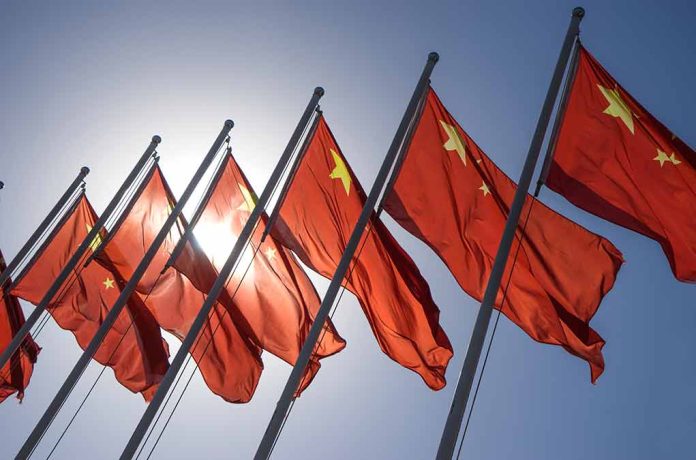
China’s military launches aggressive South China Sea patrols as the Philippines forms alliances with foreign powers, setting the stage for dangerous escalation in a $3 trillion trade route that American interests cannot afford to ignore.
Key Takeaways
- China’s People’s Liberation Army conducted strategic sea and air patrols in the South China Sea in direct response to Philippine-Japanese joint military exercises
- The Philippines is actively seeking military partnerships with nations outside the region, including the United States and Japan, which China views as a direct threat to regional stability
- China continues to reject the 2016 international arbitration ruling that invalidated its expansive territorial claims over the South China Sea
- The contested waterway handles over $3 trillion in annual ship-borne trade, making it a critical economic chokepoint that affects American interests
- Chinese military officials have put neighboring countries on notice that they remain “on high alert” to defend their claimed sovereignty
China Responds to Foreign Military Alliances in Its Claimed Territory
The Chinese military’s Southern Theatre Command executed coordinated joint sea and air patrols in the South China Sea on Saturday, deliberately timed to coincide with ongoing joint military exercises between the Philippines and Japan. This calculated show of force represents China’s increasingly aggressive stance against what it perceives as foreign interference in its territorial waters. While the Biden administration has allowed American allies in the region to be bullied, these developments highlight the consequences of weak American leadership in the Pacific, leaving a power vacuum that China is all too eager to fill.
“The Chinese military conducted patrols in the South China Sea on Saturday while a Philippine-Japan joint drill was under way,” said Senior Colonel Tian Junli, South China Morning Post
This latest round of military posturing marks the second joint drill between the Philippines and Japan since August, indicating an alarming pattern of increasing military coordination among America’s allies in the region. China has made it abundantly clear that it views these exercises as provocative and destabilizing. Senior Colonel Tian Junli, spokesman for the PLA Southern Theatre Command, explicitly condemned the Philippines for what he described as “courting countries outside the region” to conduct joint patrols, a direct reference to American involvement in regional security arrangements.
Strategic Control of a Vital Economic Lifeline
The South China Sea represents far more than just a territorial dispute – it’s a crucial economic artery through which over $3 trillion in annual trade flows. China’s increasingly aggressive military posture threatens this vital commercial lifeline that American businesses rely on for imports and exports. While the leftist media largely ignores this economic dimension, conservative Americans understand that control of these shipping lanes directly impacts prices at home and our national security interests abroad.
“The Philippines has been courting countries outside the region to conduct so-called joint patrols, raising security risks in the South China Sea and undermining regional peace and stability,” said Senior Colonel Tian Junli, South China Morning Post.
China’s military officials have made it abundantly clear that they remain “on high alert” to defend what they consider their sovereign territory. This posturing comes despite the international community’s rejection of China’s expansive claims. In 2016, the Permanent Court of Arbitration in The Hague issued a landmark ruling that invalidated China’s sweeping territorial assertions in the South China Sea – a ruling that Beijing continues to flatly reject, demonstrating their contempt for international law when it doesn’t serve their interests.
America’s Allies Left Vulnerable
The Philippines has significantly ramped up its military cooperation not only with Japan but also with the United States, conducting recent joint maritime exercises in the contested waters. These partnerships reflect growing anxiety among Southeast Asian nations about China’s increasingly assertive territorial claims. The silence from the Philippine embassy in Beijing, which failed to respond to requests for comment, speaks volumes about the delicate diplomatic tightrope these smaller nations must walk when confronting Chinese aggression.
“Any military activities that stir up trouble or create flashpoints in the South China Sea are fully under control,” said Senior Colonel Tian Junli, South China Morning Post.
China’s claim to nearly the entire South China Sea directly conflicts with the territorial claims of multiple Southeast Asian nations including Vietnam, the Philippines, Malaysia, and Brunei. These smaller countries are increasingly caught between Chinese military power and the questionable reliability of American security guarantees. The Biden administration’s weak foreign policy has left our allies exposed, forcing them to seek regional partnerships to counter Chinese expansion. This power vacuum would never exist under President Trump’s leadership, which prioritized American strength and clear boundaries with adversaries.
Implications for American Interests
The escalating tensions in the South China Sea represent a clear and present danger to American economic and strategic interests in the Indo-Pacific region. China’s military flexing isn’t merely about territorial disputes – it’s about establishing regional dominance and challenging American influence. The PLA’s aggressive patrolling and explicit warnings about being “fully in control” of any military activities in the region should alarm every American concerned about our declining global position under weak leadership that has consistently failed to stand up to Chinese aggression.
“The theater command forces remain on high alert, resolutely safeguarding China’s national sovereignty and maritime rights,” said Tian Junli, Yahoo News.
As these territorial disputes continue to simmer, American taxpayers should question why we continue to bankroll global security while our own borders remain open and unsecured. The contrast couldn’t be clearer: while China aggressively defends what it considers its sovereign territory, America’s southern border faces an unprecedented invasion with the full complicity of leftist politicians. President Trump’s America First foreign policy offered a clear alternative – standing firm with allies while demanding they contribute their fair share to mutual defense, rather than endlessly subsidizing global security at the expense of American citizens.





